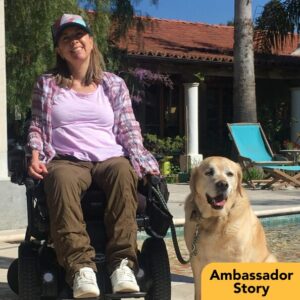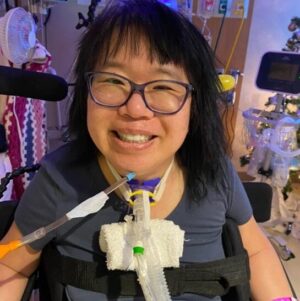For National Family Caregivers Month this November, we’re profiling individuals who have taken on a caregiver role to support their loved ones. We interviewed Rich Reedy, who has been supporting his wife since a 2014 accident left her with an incomplete spinal cord injury that requires constant care.
Do you consider yourself a caregiver?
I absolutely do consider myself a caregiver. We are fortunate enough in our household to have many people in our circle who we consider caregivers, including a young woman, Judy, who comes in twice a day to support [my wife] Eileen; and Patrick, Bridget and Jacquelyn, our three children, who help out significantly. I serve as a caregiver coordinator, in a manner of speaking: I’m not a boss and not a commander, just a “keeper of the schedule”!

Rich Reedy (left) with Eileen Reedy (center) and family.
Is emotional support as important as physical support when you care for someone with an injury?
In my experience, emotional support is a vital part of overall healing. If my wife is not in a good place or if one of our caregivers is unhappy, that attitude is definitely contagious. It’s important to me to try to keep people happy. We want people to support Eileen because their hearts are in it 100%, not because they feel like they NEED to be there. If their hearts are not in it, we do whatever we can to get them there, so that emotional connection is maintained.
What helps you to find relief when you are stressed or upset?
I find my own ways to relieve tension but, in all honesty, when a bad mood starts, it often has to clear on its own. Eileen continues to impress us with her commitment to therapy and progress. Seeing that progress in action is a great motivator and encourager. To me, it’s important to reinforce the good, for my own benefit and for the benefit of other caregivers. I play a role in helping others by reminding them that they are doing a great job and are making an important contribution. Just like in life itself, in caregiving it can make a big difference to be positive and to look for ways to ease the stress and the repetition, so you can continue to take on challenges day after day.
What is the best part of caring for a loved one? The most difficult part?
The best part is loving Eileen and supporting her on her healing journey. Caregiving really can change who you are. I was a man of no patience – now, I am a man of SOME patience, at least! I’ve still got a long way to go.
The worst part is struggling to find time to unwind and clear your mind and finding ways to avoid self-criticism. My day is composed of getting up early and making good use of every spare moment in the day. I run my own business out of my house, so I’m fortunate to be able to work in between assisting Eileen and supporting the rest of the care team. By 6 p.m., I have no brain left! Sometimes I just like to take a few minutes to sit and unwind at the end of a day. I honestly struggle to remember what my life was like before I took on this role!
Which words would you use to describe caring for a loved one?
The two words I’d use to describe caregiving would be love and commitment.
Do you have any advice for other families who are learning about caregiving after injury?
First, I would advise them to lean on professional support. While Eileen was in the hospital, the staff really showed me what my life would look like, even though I didn’t realize at the time that they were preparing me for that reality! I didn’t know that it was going to be a life-changing experience that would last longer than weeks or months. Professional support like that can really help.

Eileen with a service dog, Moose.
I’d encourage people who are about to become caregivers to take a look at caregiver resources like books and manuals. Having a guide helped me a lot – I turned to a book called Taking Care of Yourself While Providing Care. The book is written for caregivers who care for people with spinal cord injuries, but its lessons are relevant to any caregiver. Managing self-care is something that professionals and books will always emphasize; it’s as important as ever to take care of yourself when you become a caregiver, if not more important. If you’re not in a good spot, you can’t help anyone else.
My last piece of advice would be to consider accepting outside help. Our twice-per-day caregiver, Judy, has become like a part of our family, but she still has her own life and her own world outside of us. That means we can chat, talk and laugh with her and those interactions don’t overlap with the rest of our family life. It can be a really nice diversion, and that person also comes in with a “clean slate” and not a host of other worries and long-term concerns to bring to the table. She can give Eileen her full concentration, which is helpful for all of us.
We’ll be celebrating caregivers all month. Have a caregiving story to tell? Reach out to us and you could be featured in an upcoming Blog post!











